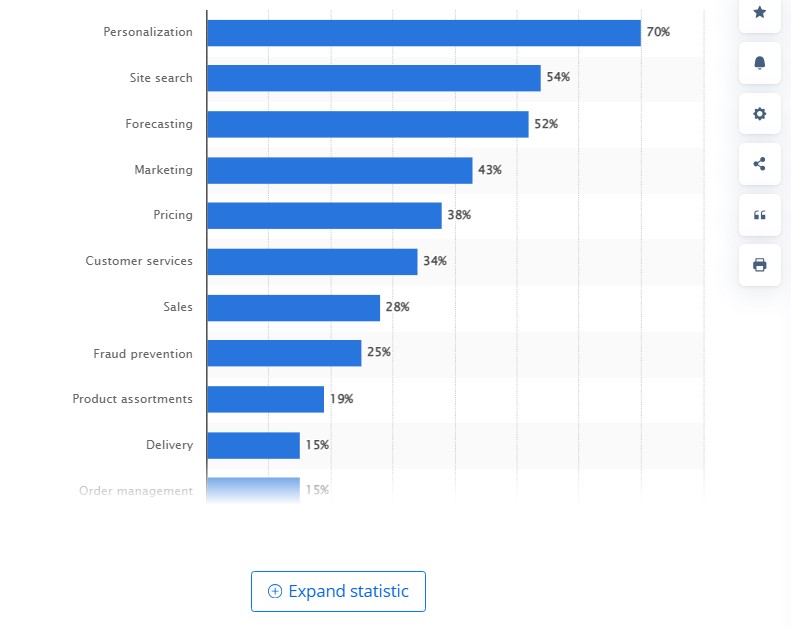How to Grow Your eCommerce Business Using AI Tools

Looking for ways to use AI tools to grow your eCommerce business? We’ve compiled 7 strategies to elevate your eCommerce store success with AI-powered solutions.
AI is becoming an indispensable tool for businesses globally. Its market is expanding rapidly, revolutionizing the way businesses operate and serve customers.
In fact, the market for AI in retail is estimated to grow continually, reaching 31.18 billion U.S. dollars by 2028.

Image via Statista
With AI’s transformative capabilities, it is poised to redefine the way we conduct online commerce.
AI tools can enhance customer service, optimize product recommendations, and analyze vast datasets for valuable insights.
So, how can you harness this technology to propel your eCommerce venture to new heights?
Luckily, we’ve done research and come up with ways you can use AI tools to grow your eCommerce business.
Keep reading!
7 Ways to Use AI Tools to Grow eCommerce Business
AI has revolutionized the eCommerce space, offering endless possibilities.
That said, here are 7 ways you can use AI tools to grow eCommerce business.
1. Enhance Customer Support With Intelligent Chatbots
AI is revolutionizing eCommerce customer service through intelligent chatbots.
Chatbots utilize natural language processing and machine learning to understand and respond to customer inquiries promptly and accurately.
The best part is, that they’re available 24/7, providing immediate assistance, improving response times, and reducing customer frustration.
They can handle routine queries, offer product recommendations, and even assist with order tracking. What’s more, you can utilize AI commenting to seamlessly frame engaging responses to your followers on social media.
By analyzing customer interactions, chatbots continuously improve their responses, delivering a more personalized and efficient service.
This not only enhances the customer experience but also frees up human agents to focus on more complex issues, ultimately boosting customer satisfaction and loyalty in eCommerce customer service.
Krafton, for instance, uses AI chatbots to cater to its multilingual customer base. They utilize dynamic content which automatically translates content depending on the customer’s location.

Image via Hubspot
The good thing is that many AI chatbots can help you streamline customer support for your eCommerce business.
Wondering which chatbots are good for your business? This curated list of the best AI chatbots by Attrock is a good read to understand the top options available and to choose the best fit for your requirements.
2. Personalize Product Recommendations
Personalization is a key driver of success in eCommerce, and AI plays a pivotal role in this transformation.
In fact, according to statistics, 70% of eCommerce business people believe AI would help their business with personalization in 2021.

Image via Statista
AI revolutionizes personalized product recommendations by harnessing data-driven insights.
Through machine learning and algorithms, AI systems analyze user behavior, historical data, and preferences to deliver tailored suggestions.
These systems identify patterns and correlations, enabling businesses to understand individual customer needs and deliver targeted offerings.
For example, eCommerce platforms like Amazon utilize AI to recommend products based on past purchases and user interactions, creating a more engaging shopping experience.
Amazon’s AI algorithms analyze a user’s browsing history, search queries, and items added to the cart to predict their preferences accurately.
By dynamically adjusting recommendations in real-time, Amazon provides users with personalized product suggestions, enhancing customer satisfaction and increasing the likelihood of additional purchases.
3. Segment Customers for Targeted Marketing
AI empowers businesses to effectively segment customers for targeted marketing, which is a crucial aspect of eCommerce marketing tactics.
Through advanced analytics and machine learning, AI can identify distinct customer groups based on various factors, such as demographics, purchase history, online behavior, and preferences.
This segmentation allows companies to tailor marketing strategies, content and offers to specific audience segments, increasing the relevance of their campaigns.
For instance, ASOS, a global clothing retailer uses AI to segment customers. By analyzing data on age, location, and past purchases, they create personalized email campaigns.
Young urban customers might receive emails featuring trendy, city-inspired fashion, while older suburban customers receive promotions for comfortable, casual wear.
This approach boosts conversion rates and customer engagement, as it ensures that marketing messages align with each group’s unique interests and needs.
AI-driven customer segmentation optimizes marketing efforts, driving higher ROI and customer satisfaction.
4. Sales Forecasting with Predictive Analytics
AI enhances sales forecasting through predictive analytics by analyzing historical data, market trends, and various relevant factors. This also makes it a great way to go about tax planning as you can estimate the amount of tax you’d have to pay.
Machine learning algorithms identify complex patterns and correlations, enabling businesses to make accurate predictions about future sales.
AI-driven sales forecasting is adaptable, providing real-time insights and helping organizations adjust strategies in response to changing conditions.
This data-driven approach optimizes inventory management, pricing, and resource allocation, ultimately improving sales performance and efficiency.
For instance, Salesforce, a leading CRM platform, utilizes predictive analytics to forecast sales and identify opportunities for its customers.
That said, leveraging predictive analytics in eCommerce marketing empowers businesses to stay ahead, maximize revenue, and adapt to changing market conditions with informed strategies.
5. Improve Product Search with AI-Driven Search
AI-driven search enhances product discovery by revolutionizing the way customers find items online.
With machine learning algorithms and natural language processing, AI-powered search engines can understand user queries better, even if they are vague or misspelled, providing more accurate and relevant results.
Additionally, AI can consider user behavior and preferences to offer personalized recommendations and refine search results over time, creating a more intuitive and efficient shopping experience.
For example, Neiman Marcus, a luxury department store, utilizes AI to improve product search for its customers.
Their AI-powered search engine takes into account user interactions, historical purchase data, and real-time trends to deliver tailored product recommendations and search results.
This not only makes it easier for customers to find items but also increases customer satisfaction and drives sales, as the AI-driven search ensures that users discover products that align with their preferences and tastes, thereby optimizing the shopping journey.
6. Dynamic Pricing Adjustment
AI plays a pivotal role in dynamic pricing adjustment for eCommerce businesses.
AI algorithms continuously analyze various factors, including demand, supply, competitor pricing, and historical data, to optimize pricing strategies in real time. This enables companies to maximize revenue, balance supply and demand, and stay competitive.
For instance, Uber, a leading ride-sharing platform, relies on AI for dynamic pricing adjustment.
Their AI-driven system, known as surge pricing considers factors such as rider demand, traffic conditions, and driver availability to adjust prices during peak hours or high-demand situations.
When demand surges, fares increase to incentivize more drivers to be on the road, ensuring faster pick-ups and reliable service for users. Uber’s AI-driven dynamic pricing benefits the company by increasing revenue and improving user experience, as it helps maintain a balance between supply and demand, ultimately serving as a win-win strategy for both the platform and its customers.
7. Customer Feedback Analysis for Continuous Improvement
AI is a powerful tool for analyzing customer feedback to drive continuous improvement. Companies can use AI to collect customer feedback from various sources, including surveys, reviews, and social media, to extract valuable insights.
Natural language processing and sentiment analysis algorithms enable AI to categorize and evaluate feedback, identifying common themes, sentiments, and specific issues.
By analyzing this information, businesses can pinpoint areas that require attention, make data-driven decisions, and refine their products or services to meet customer needs and preferences better.
For example, companies like Sephora use AI tools to grow eCommerce business by analyzing customer feedback from online reviews and social media.
By understanding customer sentiments, Sephora can adjust its product offerings and marketing strategies.
AI-driven customer feedback analysis not only aids in enhancing the customer experience but also contributes to business growth and innovation.
Final Thoughts
AI tools are revolutionizing how eCommerce businesses operate and succeed in a competitive digital space.
It empowers businesses to make data-driven decisions, respond to market changes, and streamline operations effectively.
Hopefully, the above strategies have illuminated the myriad ways in which AI can propel your eCommerce venture to new heights.
Remember, the future of eCommerce is increasingly reliant on AI, making it crucial for businesses to embrace these technologies to stay competitive and relevant in the ever-evolving space.
Start using AI tools to grow eCommerce business and stay ahead of the curve, ensuring continued growth and success in this dynamic industry.





